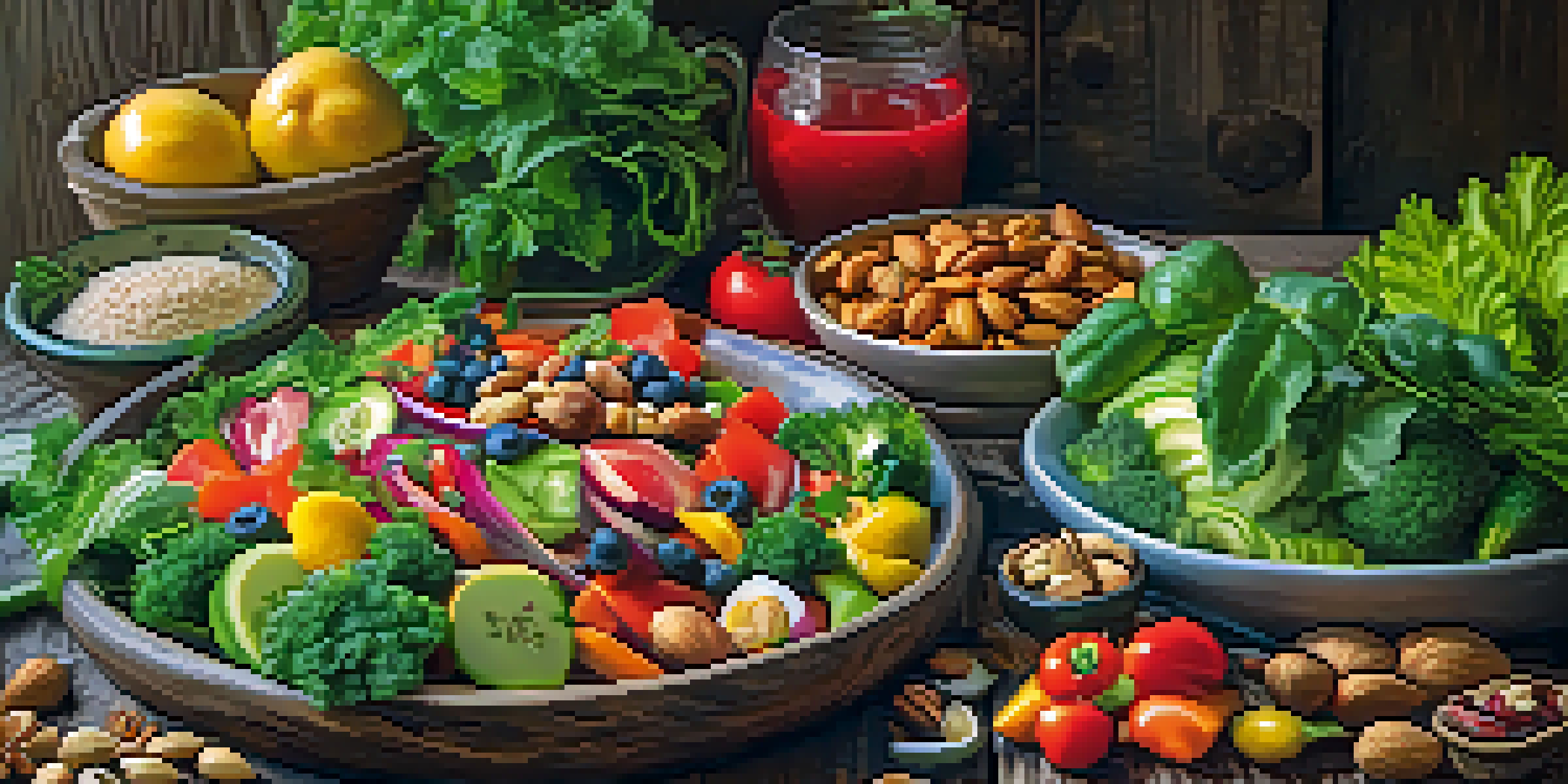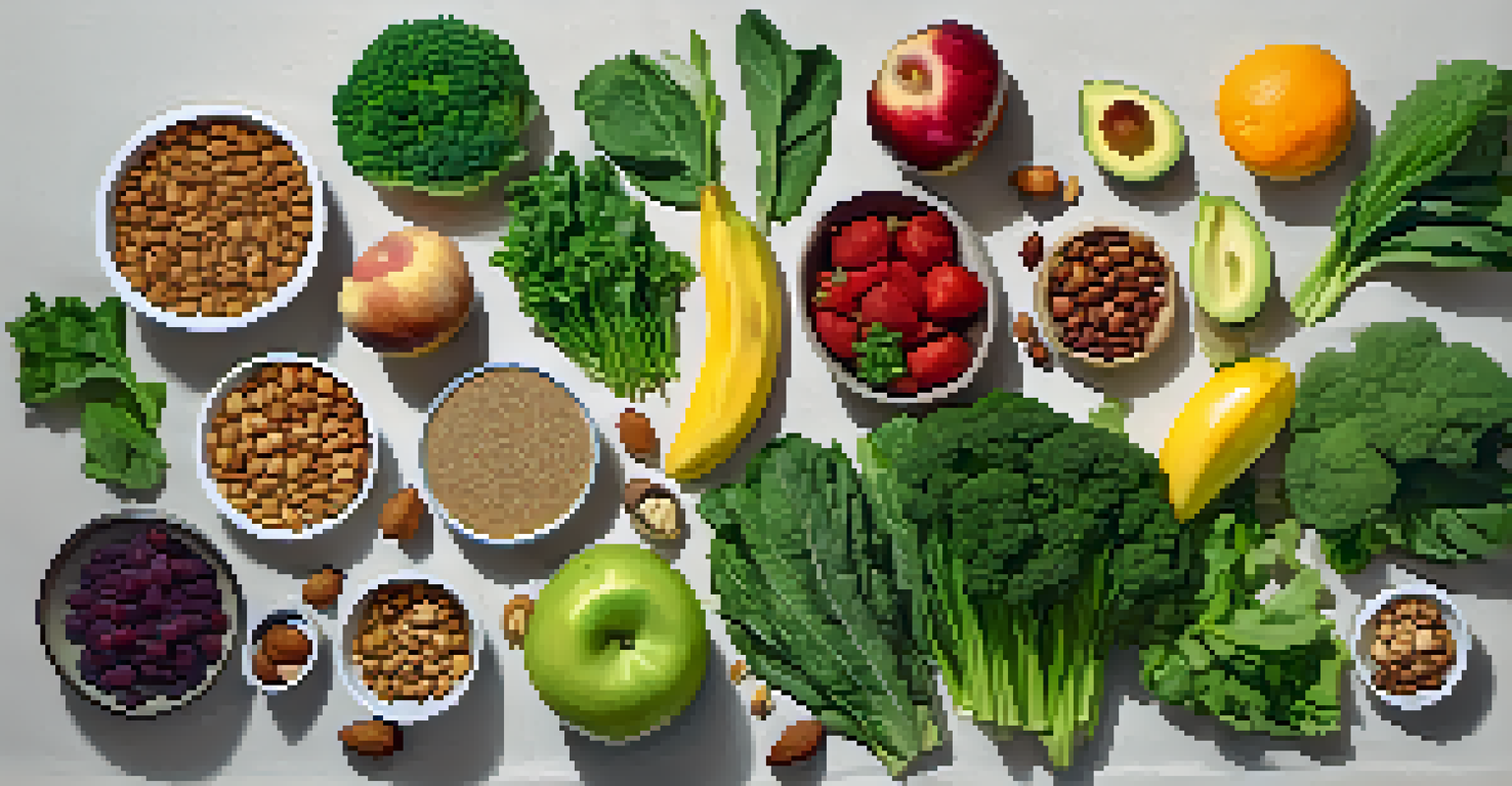The Rise of Raw Veganism and Its Cultural Implications

Understanding Raw Veganism: A Trend on the Rise
Raw veganism is a lifestyle that combines the principles of veganism with raw food consumption. This means that adherents eat plant-based foods that have not been heated above 118°F, preserving their natural enzymes and nutrients. The trend has gained traction as people seek healthier alternatives to traditional diets while aligning with ethical beliefs about animal rights.
Let food be thy medicine and medicine be thy food.
In recent years, social media has played a significant role in promoting raw veganism, with influencers sharing vibrant, colorful meals that showcase the beauty of whole foods. This visual appeal captures the attention of a broader audience, making raw vegan dishes seem not only nutritious but also exciting and desirable. It’s a lifestyle that encourages creativity in the kitchen, often leading to innovative recipes and food combinations.
As more individuals adopt this diet, it raises questions about accessibility and cultural perceptions of food. Are raw vegan options available to everyone, or does this trend cater primarily to a niche demographic? Understanding these nuances can help contextualize the raw vegan movement within broader societal trends.
Historical Context: The Roots of Raw Food Diets
The raw food movement isn't a modern invention; it has roots that trace back to the late 19th and early 20th centuries. Health reformers like Dr. Maximilian Bircher-Brenner promoted raw foods as a means to improve health and vitality. His famous dish, muesli, which combines raw oats with fruits, is still enjoyed today, illustrating that raw eating has long been part of wellness discussions.

The early raw foodists focused on the benefits of natural, unprocessed foods for health, laying the groundwork for modern interpretations of raw veganism. During the 1970s, the movement gained momentum alongside the natural foods movement, with publications and cookbooks showcasing raw recipes. This era marked a shift towards valuing organic and whole foods, which continues to resonate today.
Raw Veganism Blends Health and Ethics
Raw veganism combines a plant-based diet with raw food principles, appealing to those seeking healthier lifestyles while promoting animal rights.
By understanding this historical context, we can appreciate how raw veganism is not just a fleeting trend but part of a larger conversation about food, health, and ethics that has evolved over decades. It reflects changing attitudes toward nutrition and self-care, which often intertwine with various cultural narratives.
Cultural Significance: Raw Veganism Around the World
Raw veganism is not just a diet; it's a cultural phenomenon that varies widely across different regions. In places like California, health-conscious individuals embrace it as part of a broader wellness lifestyle. Meanwhile, in countries such as India, traditional practices like Ayurveda emphasize the consumption of raw foods for balance and health, showing how cultural beliefs can shape dietary choices.
You are what you eat, so don’t be fast, cheap, easy, or fake.
This global perspective highlights how raw veganism intersects with local food customs and traditions. For instance, in Mediterranean cultures, raw dishes like salads and dips, such as tzatziki, might be adapted to fit a raw vegan framework. This adaptability allows raw veganism to resonate with diverse populations while still maintaining a commitment to plant-based eating.
Moreover, the cultural implications are profound, as raw veganism often challenges established norms about food and health. It pushes individuals to rethink what they consider 'normal' when it comes to meals, leading to discussions about sustainability, agricultural practices, and even local food movements.
Health Benefits: Why People Are Going Raw
One of the most appealing aspects of raw veganism is its potential health benefits. Advocates claim that eating raw foods can lead to increased energy levels, better digestion, and improved skin health. The emphasis on whole, unprocessed foods means that followers often consume more vitamins, minerals, and antioxidants, contributing to overall wellness.
Many raw vegans report experiencing weight loss and enhanced mental clarity, likely due to a diet rich in fruits and vegetables. The fiber content in raw foods can also promote digestive health, making it easier for the body to process nutrients. These benefits are often shared in testimonials, further fueling interest in the lifestyle.
Cultural Influences Shape Dietary Choices
The practice of raw veganism varies globally, influenced by local customs and traditions, reflecting a broader conversation about food and health.
However, it's essential to note that transitioning to a raw vegan diet requires careful planning to ensure that nutritional needs are met. While the benefits are promising, a balanced approach is crucial to avoid deficiencies, making knowledge and education key components for those considering this lifestyle.
Challenges of Raw Veganism: Addressing the Hurdles
Despite its benefits, raw veganism isn't without challenges. Many find the diet restrictive, as it excludes cooked foods, which can limit options in social settings or while traveling. This can lead to feelings of isolation or difficulty in maintaining the lifestyle, especially in cultures where cooking is a central part of social gatherings.
The availability of fresh, organic produce can also pose a challenge, particularly in areas with limited access to grocery stores or farmer's markets. For some, the cost of high-quality raw ingredients can strain budgets, making the lifestyle less accessible. This raises questions about food equity and the economic implications of adopting raw veganism.
Moreover, misconceptions about raw veganism can create barriers to understanding its benefits. Many people associate the diet with extreme restrictions or believe it lacks variety, which can deter them from exploring it further. Addressing these hurdles is crucial to fostering a more inclusive conversation about raw veganism.
Raw Veganism and Sustainability: A Green Choice?
Sustainability is a significant concern in today’s food landscape, and many advocates of raw veganism argue that it offers an eco-friendly alternative. By focusing on plant-based foods, followers contribute to reduced carbon footprints associated with animal agriculture. This aligns with broader movements aimed at promoting environmental consciousness and sustainable living.
The raw vegan approach often emphasizes local and seasonal produce, which can minimize transportation emissions and support local economies. By choosing foods that are in season, individuals can contribute to a more sustainable food system. This connection to local agriculture fosters a sense of community and encourages responsible consumption.
Sustainability: A Key Consideration
Advocates argue that raw veganism supports sustainability through reduced carbon footprints and a focus on local, seasonal produce.
However, sustainability in raw veganism can be complex. The demand for exotic raw ingredients, like cacao or goji berries, can lead to over-exploitation of resources in other regions. Therefore, it’s essential for raw vegans to remain mindful of their food choices and strive for a balance that prioritizes both personal health and environmental responsibility.
The Future of Raw Veganism: Trends and Predictions
As raw veganism continues to gain popularity, it's likely that we’ll see further innovations in recipes and products. With a growing focus on convenience, brands are emerging that offer ready-to-eat raw meals and snacks, making it easier for busy individuals to adopt this lifestyle. This trend could help bridge the gap between raw food enthusiasts and those who may be hesitant due to time constraints.
Additionally, the rise of plant-based diets overall indicates a shift in consumer preferences. As awareness of health and environmental issues grows, more people may explore raw veganism as part of their dietary choices. This could lead to increased demand for raw food options in restaurants and grocery stores, making them more mainstream.

However, it’s essential to remain vigilant about the challenges that may arise with commercialization. The core principles of raw veganism—health, ethics, and sustainability—should guide its evolution to ensure that it remains a positive force in the food landscape. The future of raw veganism will depend on maintaining these values while adapting to the needs of a changing world.